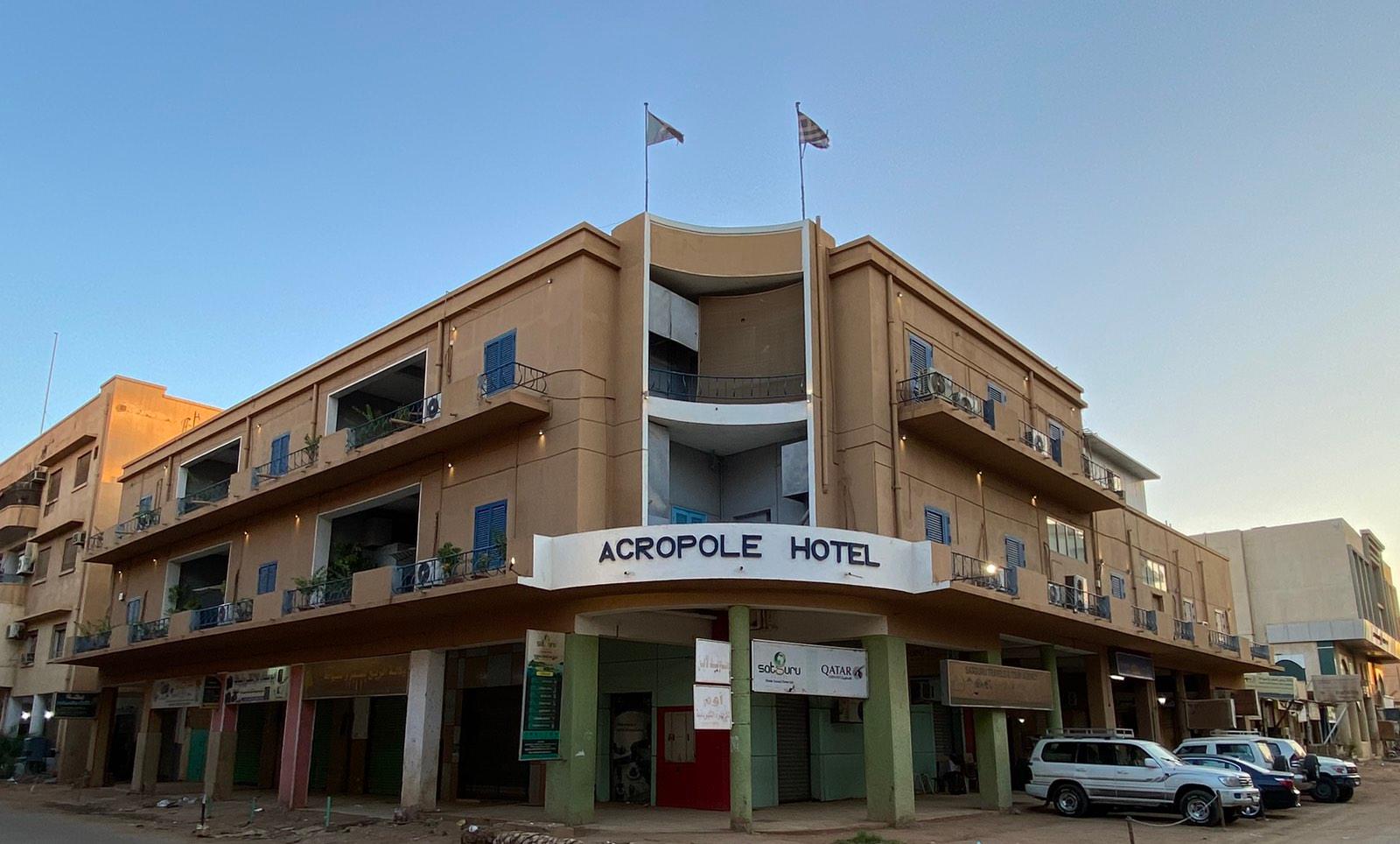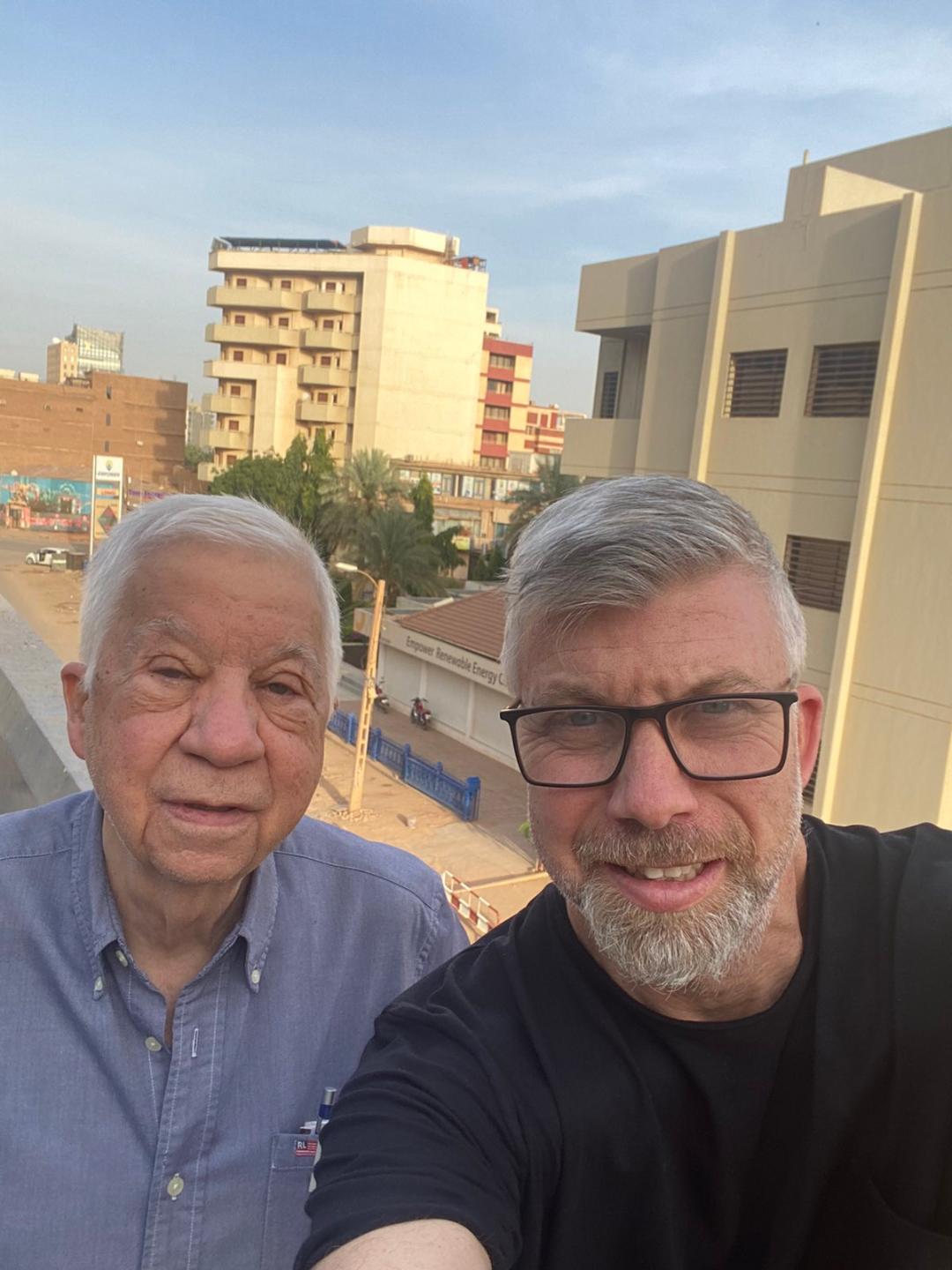
“The circumstances are tragic. Those who are trapped have been without electricity or water for four days. And since they are in the center of the city and in the center of the fighting, most of the time they lie on the floor, away from windows and with their hands on head to protect yourself.
OUR Pavlos Pagulatosson Thanasis Pagulatuwhose family has run the Greek Acropolis Hotel in downtown Khartoum since 1952, describes to K the extremely difficult situation that has developed since last Friday in the Sudanese capital.
P. Pagulatos was born and raised in Khartoum. Now he is bouncing back and forth between Athens and Khartoum, as he himself is associated with the historic hotel. As he explains: “Three pagulatai families from the hotel are fed.”
According to him, the outbreak of a new round of military conflicts in Sudan occurred in a short time. “On Good Saturday, first there was an explosion at the airport. The smoke was visible from the roof of the hotel, where everyone climbed up to see what was going on. A few minutes later the palace and the Ministry of National Defense are a little further. Key buildings, that is, those that both military men want to occupy, fell into the hands of the time.
On April 4, when I was leaving Sudan, an agreement on a mixed government was to be signed. However, the two generals hate each other and this did not happen in the end. And so the conflict came to the city, which in previous years we saw, for example, in Darfur and other suburbs, but not in the city. We knew that the agreement would be very difficult to sign, but we did not know that the worst-case scenario would happen. We had a hope that maybe one would retreat a little, the other a little…”.

P. Pagoulatos notes that four days after the (new) fuse had been lit in Sudan for more than half a century, the trapped Greeks began to despair. As he describes: “I was able to talk to my father for a few minutes today at 05:00 in the morning. He told us that they had reached the stage where they were losing hope. They don’t know how long they can last if water and food supplies are constantly reduced to a minimum,” he says, and continues:
“Now my father, my aunt, five other customers and four employees are stuck in the hotel. These customers actually made it to the airport, but got stuck there and found a way to get back. Now they, too, are “stuck” in a hotel. They are all gathered in the room, and very hesitantly someone moves to go into his room for a few minutes. There are no humanitarian corridors, as it sounds, nothing. All this is a lie. Trapped watch the news on their mobile phones for as long as they can. We tell my father to be patient until we can get him back.”
A few days before the start of the conflict that forever “flared up” in the capital of Sudan, he left Khartoum to spend the Easter holidays in Greece and on Gerasimos Pagulatosbrother of Thanasis, co-owner of the Acropolis and consul of the Greek community in Khartoum.
He believes that the fighting will continue until one of the two wins. “There have been many movements in Sudan. Usually five days in advance, he “clears up” the situation as to who will win. This time the image is more difficult. I would like to believe that in a few days there will be some initial progress, there will be a truce, even for a few hours, so that these two can discuss, ”says Gerasimos Pagulatos“ K ”and emphasizes:“ We knew that in some moment it happened, but we didn’t want to believe it.”

“Sudan has always been a realm of evil for Western countries”
OUR Antonis Chaldeoshistorian, researcher and author, who has written 11 books about the Greeks of Africa, one of which is about the Greek community in Sudan, trying to give an interpretation of what is happening now in the long-suffering country, explains that for almost 70 years, since 1956, when Sudan became an independent country, it has continuously experienced a series of military coups, successive wars and brutal dictatorships succeeding each other.
“In 1983 Sharia was introduced in the country. A country that, in the midst of all this, survived a civil war that lasted 50 years and led in 2011 to the creation of South Sudan,” he explains. “Then,” he adds, “from 1989 to 2019, the country was ruled by Omar El-Bashir, a brutal dictatorship that was theoretically overthrown in 2019 as a result of mass protests around the world. Sudanese citizens have been pushing for more rights over the past three years. But they “fell” with strong resistance from the army. The two generals presented themselves as a liberation force after Bashir, but in practice they are no different from him. Those who toppled Bashir are now fighting among themselves for power, when they should have formed a coalition to bring down the regime and lead the country to free elections in a more democratic framework.”
A. Chaldeos says that the Greeks lived in harmony with the Sudanese for two centuries. As he explains, 40 years ago there were 10,000 Greeks in Khartoum, and now there are 150 left.
“In 1977, many Greeks lost their property due to the war and were forced to leave. The introduction of sharia in 1983 made life very difficult for women. Thus, a new massive wave of flight of Greeks to Europe, America and Australia arose. In 2005, at the height of the war again, the Greek communities in South Sudan also suffered greatly.”
A historian who has studied the Greek community in Sudan in depth describes how the now small Greek community spread out on a building block in the center of the capital, which includes a Greek school, offices of the Greek community, the Metropolitan Orthodox Church. and residence of the Metropolitan. Previously, there was also the Greek Embassy, but it was closed seven years ago.
“Unfortunately, the Greek square is being bombarded with rockets. This time, the fighting is concentrated in the center of the capital, so the Western media is paying more attention than in previous times,” Mr. Haldeos explains and adds: “The Greeks are in great danger. My friendly couple told me yesterday that a mortar hit the wall of their house and destroyed it. If they were there, they would be killed.
When asked how he predicts the further development of the situation, A. Haldaios notes that in connection with the closure of the airport, it will be necessary to resort to external force in order to help not only the Greeks, but also the rest of the Europeans who are in Khartoum.
“It’s not easy, but it’s not impossible either,” emphasizes Mr. Haldeos, adding: “We do not know when and if the West will intervene, since Sudan has always belonged to the sphere of evil for Western countries and especially for the United States, because of the support of Osama bin Laden and in general in terms of terrorism. Well, it is very likely that they will allow this conflict to continue in Khartoum, as it has been for many years with South Sudan, where the West did not want to interfere. If an external force does not act, this may all come to an end when the Sudanese army, which is currently the most powerful player, overcomes another force, namely the paramilitary Rapid Support Force (RSF), led by Mohammed Hamdan Dagalo, also known as “Hemedi” . Everything will be decided by the concentration of forces of the two opposing camps in Khartoum.”
Source: Kathimerini
Anna White is a journalist at 247 News Reel, where she writes on world news and current events. She is known for her insightful analysis and compelling storytelling. Anna’s articles have been widely read and shared, earning her a reputation as a talented and respected journalist. She delivers in-depth and accurate understanding of the world’s most pressing issues.